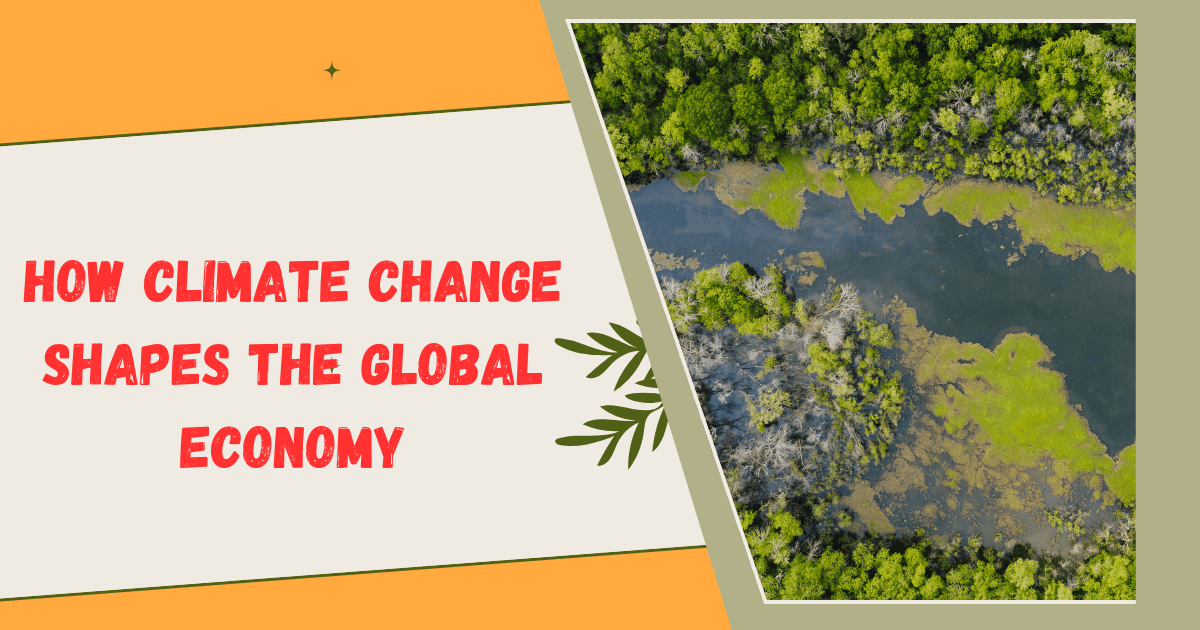Climate change stands as one of the most significant challenges the world confronts. It refers to the long-term changes in temperature, weather patterns, and sea levels caused by human activities. Climate change is having a serious impact on the economy, affecting various sectors like agriculture, health, and infrastructure. This article will explain how climate change is influencing the global economy and the measures that can be taken to tackle it.
Agriculture and Food Security
Agriculture is the backbone of many economies. A significant portion of the global population depends on agriculture for their livelihood. However, climate change is disrupting crop production by altering rainfall patterns, increasing temperatures, and causing more frequent and intense droughts and floods.
In many regions, farmers are facing erratic weather, which makes it harder to predict planting and harvest seasons. These changes affect the supply of essential crops like rice, wheat, and vegetables, leading to a rise in food prices and threatening food security.
Impact on Employment
As agriculture suffers, so does employment. Many farmers and workers in the agricultural sector are losing their livelihoods due to unpredictable weather conditions. In rural areas, where farming is the primary source of income, climate change exacerbates poverty and forces many to migrate to cities in search of jobs. This migration increases pressure on urban infrastructure and leads to unemployment in already crowded cities.
Water Resources and Energy Production
Climate change also affects water resources. Many regions are already facing water scarcity, and this issue is likely to worsen with changing rainfall patterns. The reduction in the availability of water for irrigation, drinking, and industrial use poses a significant threat to the economy.
Hydropower production, which is a major source of electricity in several countries, depends heavily on consistent rainfall to fill reservoirs. With fluctuating water levels and less predictable monsoons, energy production from hydropower has been disrupted. The resulting energy shortages can negatively impact industrial production, causing delays and financial losses.
Health and Healthcare Costs
The effects of climate change on health are already visible globally. Higher temperatures and air pollution are contributing to an increase in respiratory diseases, heat strokes, and vector-borne diseases like malaria and dengue. Healthcare systems are under increasing pressure as they struggle to cope with the rising number of patients.
Additionally, the economic burden of climate-induced health issues is significant. Governments and healthcare providers need to allocate more resources to address these challenges, diverting funds from other important sectors. This puts a strain on the overall economy, as more public spending is required for health and wellness programs.
Infrastructure Damage
Infrastructure is also at risk due to climate change. Extreme weather events such as cyclones, floods, and heatwaves are causing widespread damage to buildings, roads, bridges, and communication networks. The devastating impacts of such events result in the destruction of homes and infrastructure, costing millions in recovery and rebuilding efforts.
The repair and reconstruction efforts are a financial burden on both governments and private sectors. The lack of resilient infrastructure increases the vulnerability of communities and businesses to future climate-related events.
Impact on Business and Investment
As climate change continues to affect various sectors, businesses globally are also feeling the heat. Companies in agriculture, tourism, and insurance, for instance, are directly impacted by changing weather patterns. In the agricultural sector, the unpredictability of crops affects supply chains and increases operational costs for businesses.
In addition, climate change is causing more frequent natural disasters, which increases the financial risks for businesses. Investors are becoming more cautious about funding projects that are located in climate-vulnerable areas. This is particularly problematic in regions prone to natural disasters like floods, droughts, and cyclones.
On the other hand, there is a growing opportunity in the market for businesses that focus on green energy, sustainable farming, and climate-resilient infrastructure. Governments have also started supporting these green businesses, offering incentives for companies that adopt sustainable practices. This shift toward sustainable development is an opportunity to diversify economies while mitigating the impacts of climate change.
Government Policies and Adaptation Measures
Governments worldwide have recognized the need to address climate change and have taken steps to reduce its impact on the economy. Policies such as climate action plans and international agreements aim to reduce greenhouse gas emissions and promote sustainable development.
Many countries are focusing on renewable energy as a solution to mitigate the impact of climate change. Governments have set ambitious targets for solar and wind energy production to reduce dependency on fossil fuels. By investing in green energy, economies can reduce their carbon footprint and create new jobs in the renewable energy sector.
Additionally, governments are encouraging climate-resilient agricultural practices, such as drought-resistant crops and efficient water management techniques. These measures can help farmers adapt to the changing climate and reduce the negative effects on food production.
Role of Public Awareness and Education
Raising public awareness about the impact of climate change is crucial. Educating people about sustainable practices can lead to significant improvements in environmental conservation. Individuals, communities, and businesses can all play a role in reducing carbon emissions and using resources more efficiently.
Schools, universities, and non-governmental organizations (NGOs) are increasingly playing an important role in educating the public. These organizations offer training and resources to help people make climate-friendly decisions, from reducing waste to adopting clean energy solutions.
Conclusion
Climate change poses a significant threat to the global economy, affecting agriculture, water resources, health, infrastructure, and businesses. However, it also offers the opportunity to transform economies by investing in renewable energy, sustainable agriculture, and green technologies. By taking proactive steps now, nations can reduce the economic risks posed by climate change and create a more resilient and sustainable future for generations to come.

